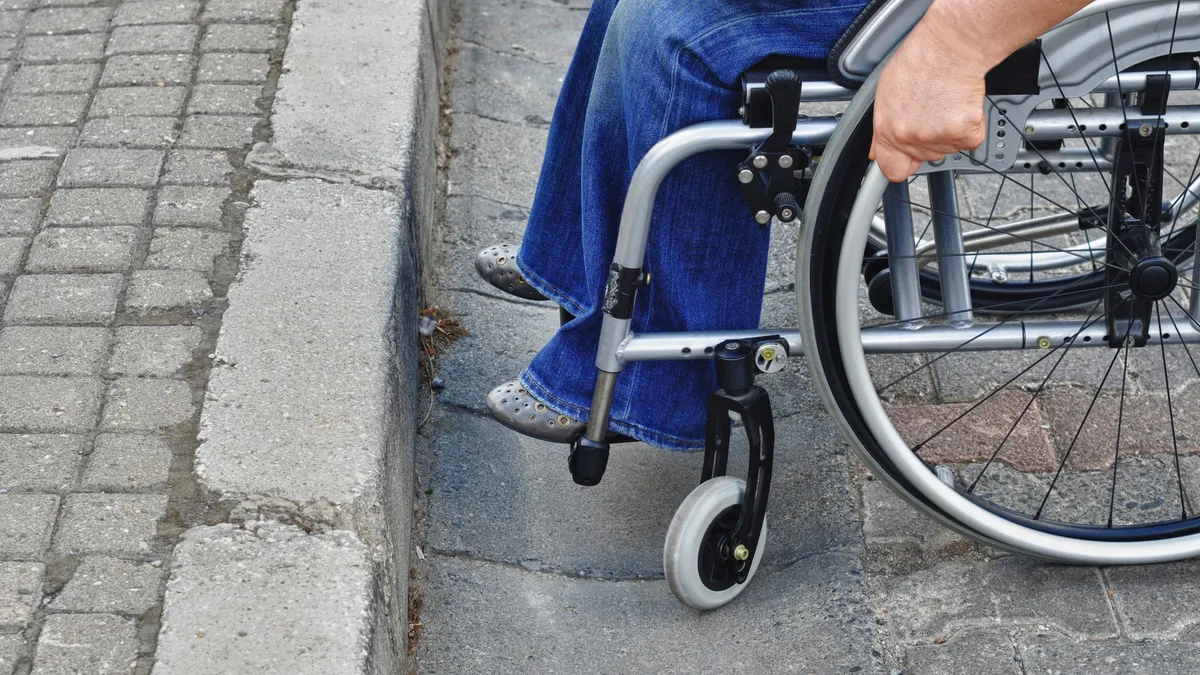Update: May 9, 2023: A federal judge on May 2 approved a settlement agreement between Philadelphia residents with disabilities and the city of Philadelphia, according to a Disability Rights Advocates press release Monday. With the agreement now in effect, the city must begin implementing its requirements. “Barrier free access is a civil right that for far too long has not been achieved in the City of Philadelphia,” said Tom Earle, CEO of Plaintiff Liberty Resources, in a statement. “Judge Bartle’s approval of our ADA class action settlement will provide a strong framework to safely improve curb ramp access at thousands of intersections, corners and sidewalks throughout all neighborhoods in our city.”
Dive Brief:
- Philadelphia has agreed to build, install or remediate at least 10,000 curb ramps over the next 15 years — hitting 2,000-ramp milestones every three years — in a lawsuit settlement with a class of disabled city residents, according to disability rights groups in a press release.
- If approved by the court, the settlement would require city officials to install accessible curb ramps where they are missing or whenever it is feasible during roadway construction projects involving pedestrian walkways and to fix existing inaccessible ramps. The city also agreed to establish a system for residents to request new curb ramps or repairs to existing ramps and post progress reports on the required work on the city’s website.
- “Activists and advocates fighting for disability rights in Philadelphia, like myself, now have a victory here in our city that we’ve wanted for a long time,” said Tony Brooks, a plaintiff in the lawsuit, in a statement. “I’m very happy that, with this settlement, we’re going to have safer and more accessible sidewalks.”
Dive Insight:
People with disabilities have often turned to the courts to make U.S. cities accessible and compliant with the federal Americans with Disabilities Act and Rehabilitation Act standards.
In 2019, New York City, for instance, settled with disability rights groups to address the city’s inaccessible curb cuts, potholes, sloped ramps, and lack of detectable warnings for blind pedestrians. Last year, a class of wheelchair users sued the city of Baltimore, claiming the city’s sidewalks failed to meet ADA requirements. And Uber reached a multimillion-dollar settlement with U.S. Justice Department in July over its practice of imposing wait time fees for passengers who need more time to board vehicles due to their disability.
In Philadelphia, the plaintiffs, represented by the nonprofit legal center Disability Rights Advocates and Philadelphia attorney David Ferleger, filed a class-action lawsuit in 2020, claiming the city failed to install, remediate and maintain curb ramps in violation of the ADA.
In the settlement agreement, the city did not admit that it violated or failed to comply with the ADA or admit any liability to the plaintiffs or the settlement class.
Latoya Maddox, president of Disabled in Action of Pennsylvania, said in a statement that thousands of people with disabilities in Philadelphia would benefit from the settlement agreement.
“Having a plan to make curb ramps more accessible will benefit many members of the disability community including people like myself, who use wheelchairs, people who use other mobility devices, and people who are blind or have low vision for years to come,” Maddox said.












